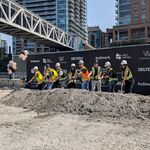Like it or not Toronto is more than just the old city or even the amalgamated city. It is the entire city region
In one way it is I guess. But in reality, they are completely separate entities, with some vast differences between them based on very different policies of independent municipal governments.
ignoring the impact of growth in the suburbs and the exurbs does nothing to improve the conditon of people living in the city proper.
It isn't a case of "ignoring" them...it's a case of it isn't our business. The 905 is what it is based on the policies of its elected municipal governments, which has nothing to do with Toronto.
They've made some mistakes in how they decided to build their cities (and someone should inform Milton that it isn't 1955). And yes, in many ways Toronto has to deal with those problems whether we like it or not, because of the integrated nature of the greater urban region we are a part of.
But Toronto's success is because of our own policies, and it is not in our best interest to bail out the 905....especially when it comes to public transit. The 905 purposely designed their cities without regard to public transit, so it's never going to work no matter how much money you throw at the problem. This imaginary GTA transit system would be devoting the vast majority of its resources trying to inefficiently move people around the 905, leaving the City of Toronto with even less than it has now.
Toronto is a manageable independent municipality. Let's not dilute what we have by becoming part of a much larger, less efficient entity. I'm ok with regional bodies like GO Transit, which is strictly a suburban commuter service. But the TTC is a completely separate animal, which should not try to over-extend itself. Aren't things challenging enough the 416 as it is?
Toll every road entering the 416 (and let them toll every road entering the 905 if they wish). Just like you have to pay an extra fare when entering TTC jurisdiction from a 905 transit vehicle.
Nothing changes unless you hit the pocketbook.
Those who made wise choices win....and those who made poor choices lose. What you are proposing is that we all lose instead by sharing the pain.





